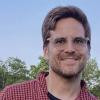
Contact Andrew S.
Mail Code CS
Andrew S. Yang
Adele Simmons Hall 134
413.549.4600

Mail Code CS
Andrew S. Yang
Adele Simmons Hall 134
413.549.4600
Andrew S. Yang works across the visual arts and natural sciences to explore our ecological entanglements at a time of profound planetary change.
His projects have been exhibited from Oklahoma to Yokohama, including the 14th Istanbul Biennial, the Museum of Contemporary Art Chicago, the Spencer Museum of Art, and the Smithsonian Museum of Natural History, with recent curatorial projects Earthly Observatory at SAIC Galleries and Making Kin-Worlds Becoming for the Center for Humans and Nature. His research and writing can be found in publications such as Leonardo, Art Journal, Biological Theory, Current Biology, and recently in the Routledge Handbook of Art, Science, and Technology Studies as well as the book series Kinship: Belonging in a World of Relations.
Yang’s teaching span environmental studies, ecological art, and expanded natural history with a focus on cross-disciplinary approaches.
He received his B.S. in Chemistry/Molecular Biology from Juniata College, an M.F.A. in Visual Arts from the Lesley University College of Art and Design, and a Ph.D. in Biology from Duke University. He was a long-time faculty member at the School of the Art Institute of Chicago and a research associate at the Field Museum of Natural History.
What are the crucial connections between the food we grow to eat and the ongoing challenges of climate change and biodiversity loss? What could it mean to "eat sustainably" or eat well? Drawing on principles of ecology, evolution, and planetary science we will explore emerging alternatives novel approaches to established agricultural practice. Topics included the promises and pitfalls of industrial agriculture, genetically-modified foods, supermarkets, meat production, as well as the complexities of food waste. This introduction to food futures will use the Hampshire Farm as a study resource, while small-group research and individual class presentations will give students an opportunity to explore their own food interests in greater depth. Keywords:agriculture, food, sustainability
Hyper-diverse, ecologically dominant, morphologically elaborate- no other animal on Earth rivals the significance of insects. Not only are insects an ideal lens for exploring principles of evolution, ecology, sustainability, and animal behavior, they also are a means through which we can critically examine conceptions of the human and the natural in the broadest sense. Through field collecting, short labs, and a variety of source material, this course offers an introduction to the planet's most diverse fauna and their integral and complex roles in ecologies as well as cultures the world over. Structured course work and student presentations will be integral. By the end of the course, you should be able to identify the major groups of insects and be conversant with core aspects of their unique biology Keywords:Insects, biodiversity, entomology, sustainability
This course is held in the Harold F. Johnson Library at Hampshire College and we will use it as our laboratory-not simply a resource for research, but an active site for creation. With our attention increasingly shaped by algorithms and mediated by screens, aisles of books offer an opportunity for open exploration, serendipity, and non-linear curiosity. While making use of short assignments in the stacks and a longer self-directed project through the semester, we will also consider the roles that archiving and arrangement can play in generating new knowledge. Our research in this course will focus on connecting ecology, geology, and culture in novel ways, with visual approaches strongly encouraged Keywords:research, transdisciplinary, environment, libraries This course could be used to fulfill the Division II Project requirement
As climates, landscapes, and ecosystems undergo unprecedented transformation we must reconsider not only our own well-being, but the future of the planet as a whole. What role can art play in reimagining the world as it is and as it might come to be? This course is a combination of seminar and studio: We will examine practices of contemporary artists that engage eco-cultural concerns and make art in multiple media-on paper, outside, as speculative proposals, and as experiments in expanding aesthetics. Student presentations, readings, studio time, and critique will scaffold our work through the course. Keywords: Art, ecology, global warming, biodiversity loss, Anthropocene Reading discussion, studio time, critiques, and student presentations will be core course components Keywords:Art, ecology, global warming, Anthropocene
What are the crucial connections between the food we grow to eat and the ongoing challenges of climate change and declining biodiversity? What could it mean to "eat sustainably"? Starting from the basic ecological principles of food, we will explore novel approaches and alternatives to established agricultural practices, examining the promises and pitfalls of industrial agriculture, genetically-modified foods, supermarkets, traditional meat production, as well as the complexities of food waste. Further small-group research into emerging food systems will lead to a series of zines introducing others to critical questions about our food futures from an ecological perspective. Keywords:Climate, agriculture, ecology, sustainability
How does our understanding of the wider, more-than-human world guide how we choose to live within it? In a time of shifting climates and ecologies, the ways in which we come to "know nature" can be pivotal. We will make use of observational and experiential exercises in class together with readings and films that span early European notions of an ordered cosmos, diverse scientific approaches like hypothesis testing and systems thinking, perspectives of Indigenous knowledge practices, and non-western points of view. Considering these together will help us critically reflect on the values and commitments that shape our actions and eco-logic. In-depth class discussions and written reflections will be a regular feature of our collective study. Keywords:sustainability, philosophy, science, ecology, environment